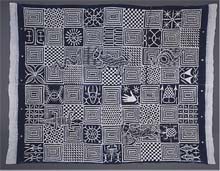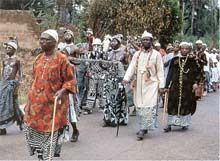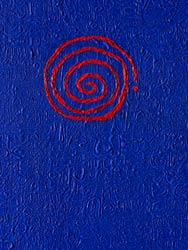 |
|
Nsibidi is an ancient system of graphic communication indigenous to the Ejagham peoples of southeastern Nigeria and southwestern Cameroon in the Cross River region. It is also used by neighboring Ibibio, Efik and Igbo peoples. Aesthetically compelling and encoded, nsibidi does not correspond to any one spoken language. It is an ideographic script whose symbols refer to abstract concepts, actions or things and whose use facilitates communication among peoples speaking different languages.
Nsibidi comprises nearly a thousand symbols that can be drawn in the air (as gestures), on the ground, on skin (as tattoos), on houses and on art forms, such as masks and textiles. Though it is enjoyed as an artistic practice by the general public, deeper knowledge of the nsibidi symbols is restricted to members of men's associations, which once controlled trade and maintained social and political order.
Nsibidi continues to inspire the work of many Nigerian contemporary artists such as Victor Ekpuk, whose lyrical, densely-scripted works are on view in this exhibition.
|

Ukara cloth
Igbo peoples, Nigeria. 1983.
Cotton, indigo dye, 256.5 x 198.1 cm.
Fowler Museum at UCLA.
Anonymous gift, x84.24.
Photograph by Don Cole.
Nigerian Leopard Society members have created some of the most brilliant and elaborate displays of nsibidi. On ritual occasions, members create a dramatic presence with nsibidi-laden ukara cloth. An abundance of signs (leopards, lizards, drums, staffs, geometric and organic shapes) cover the surface of the cloths that each member ties around his waist to form a long skirt. The nsibidi is created by tightly stitching the design on a white cloth that is then dyed with indigo. After drying, the stitching and ties are removed to reveal the white nsibidi signs that appear against the deep blue background, creating a stunning cloth that is immediately recognizable as an emblem of the Leopard Society and a testament to their possession of knowledge, power, and beauty.
|

Ekpe members wearing ukara cloth in procession
Arochukwu region, Nigeria, 1989.
Photograph by Eli Bentor, 1989.
|

Good Morning, Sunrise (detail)
Victor Ekpuk, b. 1964, Nigeria
2001
Acrylic on canvas
Collection of the artist
Victor Ekpuk's art is dedicated to manipulating scripts and graphic symbols. His drawings, paintings and digital images are abuzz with language. The artist employs invented script as well as signs from Nigeria's ideographic system nsibidi to create richly textured works. In this painting, the spiral is an nsibidi sign meaning journey, but it also suggests the sun and eternity. Ekpuk's strong palette of warm reds, deep blacks, cool blues and whites contributes to the overall sense of animation.
|

|
|

|







